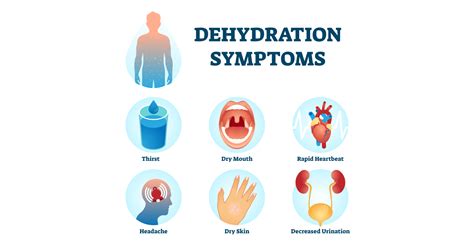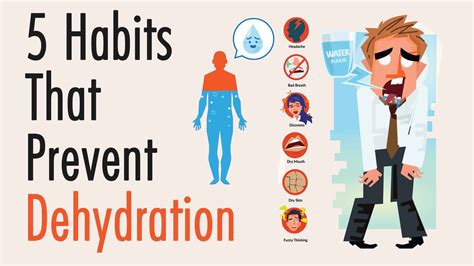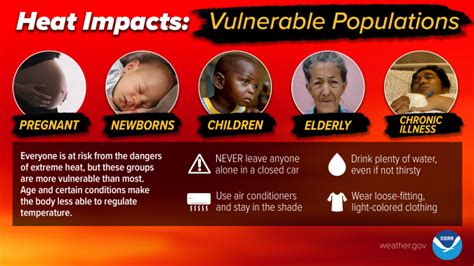Intro
Identify dehydration symptoms, causes, and treatments. Learn about mild to severe signs, including dry mouth, fatigue, and dark urine, and discover how to prevent dehydration with proper hydration and electrolyte balance.
Dehydration is a common and potentially life-threatening condition that occurs when the body loses more fluids than it takes in. This can happen for a variety of reasons, including excessive sweating, vomiting, diarrhea, and not drinking enough water. Dehydration can affect anyone, regardless of age or health status, and it's essential to recognize the symptoms and take prompt action to prevent serious complications. In this article, we'll delve into the importance of understanding dehydration symptoms, its causes, and the steps you can take to stay hydrated and healthy.
Dehydration is a significant public health concern, particularly among vulnerable populations such as older adults, young children, and people with underlying medical conditions. According to the World Health Organization (WHO), dehydration is a leading cause of morbidity and mortality worldwide, accounting for millions of deaths each year. The good news is that dehydration is often preventable and treatable, and being aware of the symptoms and taking proactive steps can make a significant difference. Whether you're an athlete, a busy professional, or simply someone who wants to stay healthy, understanding dehydration symptoms is crucial for maintaining optimal health and well-being.
The human body is composed of approximately 60% water, and it needs adequate hydration to function properly. Even mild dehydration can cause a range of symptoms, from headaches and fatigue to dizziness and difficulty concentrating. Severe dehydration, on the other hand, can lead to life-threatening complications, such as organ failure, seizures, and even death. The key to preventing dehydration is to recognize the symptoms early on and take prompt action to replenish lost fluids and electrolytes. By doing so, you can avoid serious health problems and maintain optimal physical and mental performance.
Understanding Dehydration Symptoms

Dehydration symptoms can vary depending on the severity of the condition, the age and health status of the individual, and the underlying cause of dehydration. Mild dehydration may cause symptoms such as dry mouth, dark urine, and fatigue, while severe dehydration can lead to more serious symptoms, including seizures, coma, and even death. It's essential to recognize the early warning signs of dehydration and take prompt action to prevent complications. Some common dehydration symptoms include:
- Dry mouth and throat
- Dark yellow or brown urine
- Fatigue and weakness
- Headaches and dizziness
- Nausea and vomiting
- Muscle cramps and spasms
- Rapid heartbeat and low blood pressure
Causes of Dehydration
Dehydration can occur due to a variety of reasons, including:- Excessive sweating, such as during intense exercise or in hot weather
- Vomiting and diarrhea, which can lead to rapid fluid loss
- Not drinking enough water, particularly in people who are physically active or live in hot climates
- Certain medical conditions, such as diabetes, kidney disease, and heart failure
- Medications, such as diuretics and laxatives, which can increase urine production and lead to dehydration
Preventing Dehydration

Preventing dehydration is often a matter of common sense, and there are several steps you can take to stay hydrated and healthy. Here are some tips:
- Drink plenty of water throughout the day, aiming for at least eight glasses (64 ounces) daily
- Monitor your urine output, aiming for pale yellow or clear urine
- Avoid excessive sweating by staying cool, wearing light clothing, and taking regular breaks
- Eat foods that are high in water content, such as fruits, vegetables, and broth-based soups
- Avoid sugary drinks and caffeine, which can exacerbate dehydration
Treatment Options
If you're experiencing dehydration symptoms, it's essential to seek medical attention promptly. Treatment options may include:- Oral rehydration therapy (ORT), which involves drinking a solution of water, salts, and sugars to replenish lost fluids and electrolytes
- Intravenous (IV) fluids, which may be necessary in severe cases of dehydration
- Medications, such as anti-diarrheal medications or anti-vomiting medications, to manage underlying symptoms
Dehydration in Vulnerable Populations

Dehydration can affect anyone, but certain populations are more vulnerable to dehydration due to age, health status, or other factors. These populations include:
- Older adults, who may be more susceptible to dehydration due to age-related changes, such as decreased thirst sensation and impaired kidney function
- Young children, who may be more prone to dehydration due to their small size and developing kidneys
- People with underlying medical conditions, such as diabetes, kidney disease, and heart failure, which can increase the risk of dehydration
Recognizing Dehydration Symptoms in Vulnerable Populations
Recognizing dehydration symptoms in vulnerable populations requires extra vigilance, as these individuals may not always be able to communicate their symptoms effectively. Here are some tips:- Monitor for signs of dehydration, such as dry mouth, dark urine, and fatigue
- Encourage vulnerable individuals to drink plenty of water throughout the day
- Offer foods that are high in water content, such as fruits, vegetables, and broth-based soups
- Seek medical attention promptly if you suspect dehydration
Conclusion and Next Steps

In conclusion, dehydration is a significant public health concern that can affect anyone, regardless of age or health status. By understanding dehydration symptoms, causes, and prevention strategies, you can take proactive steps to stay hydrated and healthy. If you're experiencing dehydration symptoms, it's essential to seek medical attention promptly to prevent serious complications. Remember to drink plenty of water, monitor your urine output, and avoid excessive sweating to stay hydrated and healthy.
What are the common symptoms of dehydration?
+Common symptoms of dehydration include dry mouth, dark urine, fatigue, headaches, and dizziness.
How can I prevent dehydration?
+To prevent dehydration, drink plenty of water throughout the day, monitor your urine output, and avoid excessive sweating.
What are the treatment options for dehydration?
+Treatment options for dehydration include oral rehydration therapy (ORT), intravenous (IV) fluids, and medications to manage underlying symptoms.
We hope this article has provided you with a comprehensive understanding of dehydration symptoms, causes, and prevention strategies. If you have any further questions or concerns, please don't hesitate to comment below. Share this article with your friends and family to help raise awareness about the importance of staying hydrated and healthy. Remember to drink plenty of water, monitor your urine output, and avoid excessive sweating to stay hydrated and healthy.
